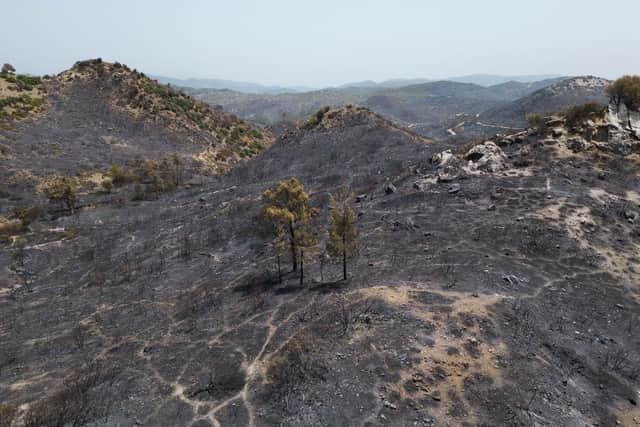Wildfires Greece: Should anyone be travelling to Greek islands as authorities struggle to battle wildfires?
The decision of whether or not to travel to a disaster-hit area is a difficult one – and not just for the sake of fears over your own safety while on holiday, but from a moral point of view.
The media focus of the wildfires ravaging Greek islands, parts of Italy and Algiers has, here in Scotland at least, been predominantly on the tourists. Cancelled flights, shuttered hotels, lost luggage and passports.
Advertisement
Hide AdAdvertisement
Hide AdThere is no doubt many holidaymakers have had a frightening time, far removed from the relaxing break they had been hoping for. People have told how they were forced to leave luggage behind and run – wet T-shirts held over their mouths to filter the smoke – to a waiting minibus before being whisked away to safety by their holiday tour company. Others related stories of camping rough on a floor in a school hall with just the clothes they are standing up in, many of them families with small children, while they battled to find a spot on an earlier flight home.


For those staying on parts of the islands not affected by the fires – Rhodes is 541 square miles – the juxtaposition was uncomfortable.
The idea of sunbathing on a picturesque beach, even if they could be sure their hotel resort was safe from the flames, jarred with the reality that close by, thousands of people were being evacuated from their homes, with the knowledge their houses, workplaces, schools may all have been burnt to the ground by the time it is safe to return.
Some locals voiced their anger that tourists’ complaints about losing their luxury break were being given so much air time, when they had lost everything. The situation is a stark reminder of how far apart people’s experiences of a situation can be, even when geographically they are extremely close.
However, the messages to tourists have been mixed. While package holiday firms paused flights to Rhodes and some of the other affected areas, airlines were still flying, with many people at risk of losing their hard-earned holiday fund. The fire-hit regions have not been added to the UK Government’s ‘red list’, which warns people not to travel unless absolutely necessary – and which would make it easier for holidaymakers to claim on their travel insurance.
Yet some Greeks urged tourists to keep coming, to inject essential tourism cash into the economy. Tourism minister Olga Kefalogianni publicly insisted it was business as usual for areas of Rhodes and Corfu which were not directly affected by the fires.
"It’s particularly important to stress only a small part of the island of Rhodes is affected,” she said.
As the days went on and footage from Rhodes showed burned buildings, scorched earth and exhausted emergency services workers battling unyielding flames, it became clear an influx of visitors holiday to the affected islands would put an extra burden on the already stretched Greek authorities.
Advertisement
Hide AdAdvertisement
Hide AdIt took an easyJet pilot with more than a usual amount of common sense to tell passengers who had already boarded his flight to Rhodes earlier this week that they should not travel – that going to the island was “a terrible idea”.
Greece will need our tourism to help it recover. Just perhaps not yet.
Comments
Want to join the conversation? Please or to comment on this article.
